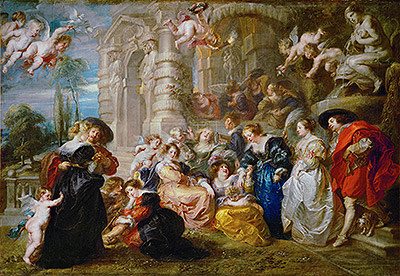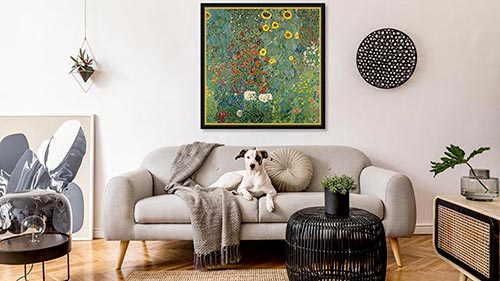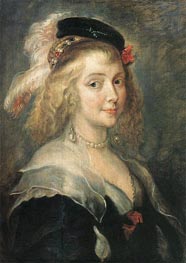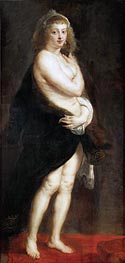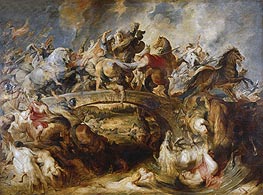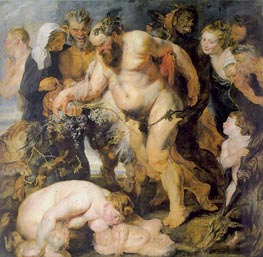Garden of Love, c.1633 by Peter Paul Rubens
Canvas Print - 3454-RPP
Location: Prado Museum, Madrid, SpainOriginal Size: 199 x 286 cm
Giclée Canvas Print | $57.11 USD
Your Selection
Customize Your Print
By using the red up or down arrows, you have the option to proportionally increase or decrease the printed area in inches as per your preference.
*Max printing size: 40.8 x 59.1 in
*Max framing size: Long side up to 28"
"Garden of Love" will be custom-printed for your order using the latest giclée printing technology. This technique ensures that the Canvas Print captures an exceptional level of detail, showcasing vibrant and vivid colors with remarkable clarity.
Our use of the finest quality, fine-textured canvas lends art reproductions a painting-like appearance. Combined with a satin-gloss coating, it delivers exceptional print outcomes, showcasing vivid colors, intricate details, deep blacks, and impeccable contrasts. The canvas structure is also highly compatible with canvas stretching frames, further enhancing its versatility.
To ensure proper stretching of the artwork on the stretcher-bar, we add additional blank borders around the printed area on all sides.
Our printing process utilizes cutting-edge technology and employs the Giclée printmaking method, ensuring exceptional quality. The colors undergo independent verification, guaranteeing a lifespan of over 100 years.
Please note that there are postal restrictions limiting the size of framed prints to a maximum of 28 inches along the longest side of the painting. If you desire a larger art print, we recommend utilizing the services of your local framing studio.
*It is important to mention that the framing option is unavailable for certain paintings, such as those with oval or round shapes.
If you select a frameless art print of "Garden of Love" by Rubens, it will be prepared for shipment within 48 hours. However, if you prefer a framed artwork, the printing and framing process will typically require approximately 7-8 days before it is ready to be shipped.
We provide complimentary delivery for up to two unframed (rolled-up) art prints in a single order. Our standard delivery is free and typically takes 10-14 working days to arrive.
For faster shipping, we also offer express DHL shipping, which usually takes 2-4 working days. The cost of express shipping is determined by the weight and volume of the shipment, as well as the delivery destination.
Once you have added the paintings to your shopping cart, you can use the "Shipping estimates" tool to obtain information about available transport services and their respective prices.
All unframed art prints are delivered rolled up in secure postal tubes, ensuring their protection during transportation. Framed art prints, on the other hand, are shipped in cardboard packaging with additional corner protectors for added safety.
Painting Information
The central work of Rubens's late creative period is The Garden of Love, which received unusually high praise even in its day, as evidenced, among other things, by the numerous copies. The painting undoubtedly owes its appearance to Rubens's marriage to Helene Fourment, since its essential theme is the introduction of a young woman to love and marriage. On the far left stands a young woman with girlishly gentle features. Timidly glancing at the scene before her, she pauses, while the cavalier who has his arm around her waist encourages her to go on, aided by a winged cupid with all his might. That this is a married couple is indicated by the god of love flying above, holding a yoke in his hand, a symbol of marriage. With the couple perched on the ground beside them, the man also admonishes the woman, who here seems to listen more readily to his assurances. The three seated female figures in the central group, to each of whom a cupid is attached, are characterised quite differently in their behaviour, and are undoubtedly the embodiments of the three kinds of love: the figure sitting calmly on the left as amor humanus, the middle figure looking ecstatically upwards as amor celestis, and the mature figure on the right, in whose lap the little cupid is nestled, as amor vulgaris. The experienced matron is holding the hand of a young schoolgirl in love - surely a reminiscence of the fresco Aldobrandini Wedding - who, with her timid, hesitant demeanour, corresponds to the woman, also dressed in blue, at the left end of the picture; here "the same woman is not depicted twice, but Rubens so insistently emphasizes the resemblance that one could say that the young woman perceives the realm of love as a vision before her into which she has just been ushered". The couple on the right below the fountain-statue of Venus shows us man and woman at last in full understanding: here there is no need for exhortations, the enlightened companion steps confidently forward. It is established early on that Rubens has presented himself - albeit more youthful than he was then - in the image of the man of the couple on the left. Nor can the resemblance of his young partner and the blue-clad woman on the right to his second wife be denied. "The schoolgirl in love is Helene Fourment and at the same time more than a particular woman; her predestined husband is Rubens, but more than that; the relationship between the two is seen as the embodiment of the possible relationship between man and woman in general. Venus is at once a statue of a fountain and a powerful goddess, the setting is a patrician garden in Antwerp and Venus's grove; this multi-layered characterisation, which defies clear interpretation, defines the whole narrative as a leitmotif.
